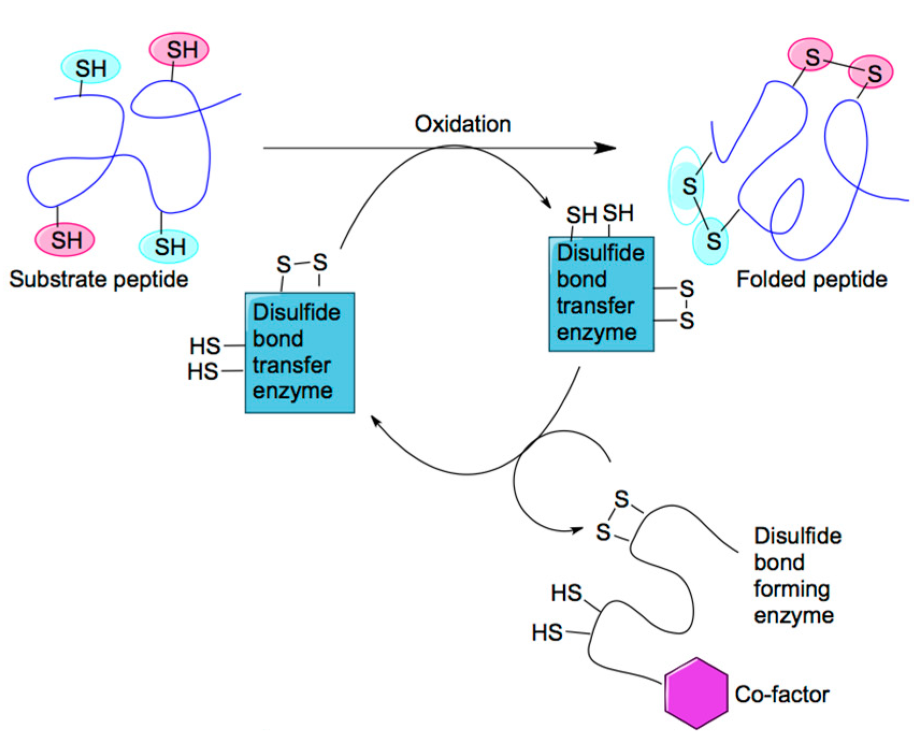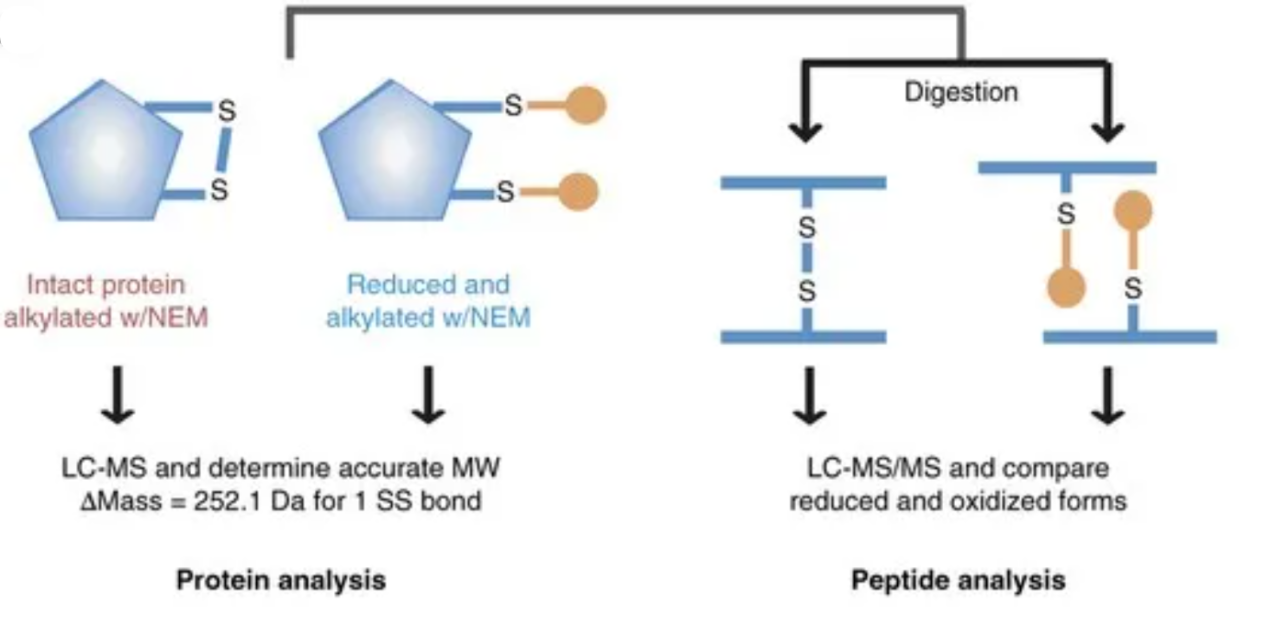Targeted Disulfide Bond Characterization Service
MtoZ Biolabs provides specialized Targeted Disulfide Bond Characterization Services using advanced mass spectrometry-based analytical workflows. By combining non-reducing enzymatic digestion with high-resolution nanoLC-MS/MS detection, we precisely identify and confirm disulfide bond linkages in specific target proteins. This service is designed for researchers in biopharmaceutical development, structural biology, and protein engineering who require high-confidence disulfide mapping for therapeutic proteins, antibodies, and other complex biomolecules.
What Is Disulfide Bond?
Disulfide bonds are covalent linkages formed between the thiol groups of two cysteine residues within or between polypeptide chains. These bonds play crucial roles in maintaining protein stability, folding, and biological activity.

Patil, N. A. et al. Int J Mol Sci. 2015.
Figure 1. Formation of New Disulfide Bonds
Importance of Disulfide Bond Characterization
🔸Structural Stability
Disulfide bonds provide covalent links that stabilize protein tertiary and quaternary structures, ensuring the correct folding and conformational rigidity essential for biological function.
🔸Functional Activity
Properly formed disulfide bonds maintain active sites and binding domains in the correct orientation, directly influencing enzymatic activity and receptor interactions.
🔸Consequences of Mispaired or Altered Bonds
When disulfide bonds are mispaired, reduced, or rearranged, proteins may undergo conformational disruption, resulting in:
1. Incorrect Folding: Disruption of the native structure and loss of correct spatial alignment, resulting in nonfunctional proteins.
2. Aggregation or Precipitation: Unstable disulfide networks promote intermolecular bonding, leading to unwanted aggregates.
3. Loss of Activity: Erroneous disulfide pairing can alter protein conformation, reducing or abolishing biological activity.
4. Biopharmaceutical Quality Issues: In therapeutic proteins or antibodies, disulfide errors compromise product stability, efficacy, and batch consistency, potentially leading to immunogenic responses or therapeutic failure.
Targeted Disulfide Bond Characterization Service at MtoZ Biolabs
MtoZ Biolabs' Targeted Disulfide Bond Characterization Services are specifically tailored to analyze client-specified proteins. We apply an optimized workflow that integrates selective sample preparation with advanced mass spectrometric detection for unambiguous disulfide mapping. Our goal is to deliver high-confidence structural information to support protein design, validation, and quality assessment.
1. Non-reducing Enzymatic Digestion
- Samples are enzymatically digested without reduction or alkylation to preserve native disulfide linkages.
- Proteases such as trypsin, Lys-C, or chymotrypsin are used under mild conditions to generate disulfide-linked peptide pairs.
2. High-Resolution nanoLC-MS/MS Detection
- Peptides are separated using nano-scale liquid chromatography and analyzed on high-resolution mass spectrometers (Orbitrap or Q-TOF).
- Characteristic precursor and fragment ions corresponding to disulfide-linked peptides are detected and annotated using specialized database search algorithms.
3. Data Interpretation and Validation
- Identified disulfide bonds are verified through retention time, charge state, and MS/MS fragmentation pattern correlation.
- Comparative analysis between reduced and non-reduced states confirms linkage specificity and completeness.
This combination of non-reducing digestion and high-resolution LC-MS/MS ensures precise identification of cysteine-cysteine connectivity and disulfide pairing in both simple and complex proteins.

Lu, S. et al. Nat Methods. 2015.
Figure 2. Disulfide Bond Identification Research Route
Why Choose MtoZ Biolabs
☑️High Precision and Confidence: Integration of non-reducing enzymatic digestion and high-resolution nanoLC-MS/MS ensures accurate identification of true disulfide linkages.
☑️Minimal Sample Consumption: Optimized workflows require small sample quantities while maintaining high analytical depth.
☑️Applicable to a Wide Range of Proteins: Suitable for antibodies, enzymes, receptors, fusion proteins, and synthetic constructs.
☑️Customizable Analytical Design: Tailored methods to match specific protein sequences or disulfide network complexity.
☑️Experienced Scientific Team: Expertise in protein chemistry, mass spectrometry, and data interpretation ensures reliable results.
Applications of Targeted Disulfide Bond Characterization Service
1. Antibody Characterization
Confirm interchain and intrachain disulfide linkages in therapeutic antibodies, ensuring correct hinge region connections and structural integrity.
2. Recombinant Protein Validation
Verify cysteine connectivity in recombinant enzymes, hormones, or peptides to ensure proper folding and biological activity.
3. Stability and Stress Testing
Monitor disulfide bond reshuffling or reduction during storage, formulation, or exposure to stress conditions such as heat and oxidation.
4. Biosimilar and Biologic Comparability
Compare disulfide bonding patterns between biosimilar and reference products to confirm molecular equivalence and manufacturing consistency.
5. Disease Mechanism Research
Investigate how disulfide bond disruption contributes to protein misfolding, aggregation, or dysfunction in neurodegenerative and metabolic diseases.
6. Formulation and Process Optimization
Evaluate the impact of pH, redox conditions, and purification processes on disulfide bond integrity during bioprocess development.
FAQ
Q1: What Types of Samples Are Suitable?
MtoZ Biolabs accepts a wide range of biological and protein-based samples for Targeted Disulfide Bond Characterization Services. We can analyze purified proteins, recombinant proteins, antibodies, and other therapeutic proteins directly. Alternatively, clients may also submit cells, tissues, or biological fluids, from which our experts will extract and purify the target protein before disulfide bond characterization.
Q2: How Should I Prepare My Samples?

- All samples should be stored at –80°C.
- Use dry ice or ice packs during shipment to preserve protein integrity.
- Avoid freeze–thaw cycles that may alter disulfide linkages.
For more information, please refer to Sample Submission Guidelines for Proteomics.
Q3: What Is the Service General Workflow?

Q4: What Data Formats Are Provided?
- Raw MS data files (.raw, .wiff, .d)
- Processed data files (.mzML, .csv)
- Summary tables (.xlsx, .csv)
- Spectral figures (.pdf, .png)
- Final analytical report (.pdf)
All files are compatible with standard data analysis and documentation systems.
Start Your Project with MtoZ Biolabs
Contact us to discuss your experimental design or request a quote. Our technical specialists are available to provide a free business assessment.








